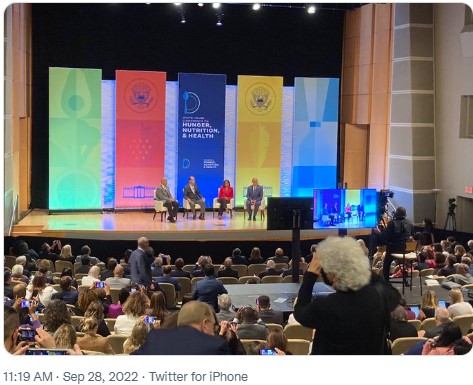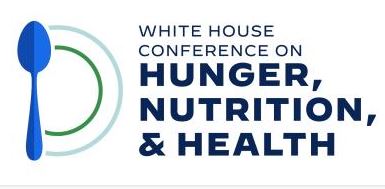The White House Conference: They Pulled It Off!
Despite chaotic organization (see note below), the White House Conference on Hunger, Nutrition, and Health was inspiring (you can watch it on YouTube here). It was exciting to be in the room where it happened, as you can see from my photo-taking (courtesy of tweet by Suzanna Martinez).

The conference had a laser-like focus on ending hunger and hunger inequities. Although there was much talk of diet-related diseases, it was not at all about preventing obesity and its chronic disease consequences in the general population. Instead, its aim was to make sure that poor people, especially those of color, have access to healthy, culturally appropriate diets at a price they can afford.
Common themes
Bipartisan: Ending hunger has to be a united effort (Republicans were barely represented, but not for lack of trying)
Diet-related disease: none of us ever expected to hear that phrase from high elected officials, let alone POTUS
Lived experience: Many of the panels included people who had grown up on foods stamps, and President Biden was introduced by Jimmieaka Mills of Houston, TX (her name was not listed in the program; I found it on Twitter) who spoke eloquently of how much food assistance meant to her life.
Food at the center: it must stop being an afterthought.
Food as Medicine: This refers to the health care system’s use of food prescriptions or distributions. Alhough his idea is sometimes perceived as paternalistic—food should really be about pleasure and culture (see ConscienHealth)—it plays well politically.
Impressions
Almost everything related to the conference is on the website. My reactions.
How it felt: It was a joy to see old friends and colleagues who care deeply about food and preventing hunger. We hadn’t seen each other since before the pandemic. Hugs all around.
The tone: This was a packed auditorium with a standing room audience, happy to be there, appreciative, and enthusiastic.
The love: Almost everyone thanked Congressman Jim McGovern who has tried to get this conference held for years. He got—and deserved—standing ovations.
The speeches
The President: Biden mostly reiterated the main points of the National Strategy, but insisted on the value of the Child Tax Credit (see my previous post on this). This got a standing ovation (along with a couple of others). Ending food insecurity, he said, is a way to treat each other with decency.
Jim McGovern: When he worked with George McGovern (no relation, a Democrat) and Republican Bob Dole on food issues, ending hunger was a bipartisan goal. Now, 35 million Americans needi food assistance; hunger should be illegal.
Cory Booker: Americans are in the midst of a storm of diet-related disease. Congress will hold hearings on Food as Medicine. We need to put the F back in FDA (ovation).
The plenary panel
Debbie Stabenow, who heads the Senate Ag Committee; “We will not cut SNAP.”
Rosa de Lauro, who heads the House appropriations committee: “I like holding the gavel. We will fund what we need to.”
Eric Adams, mayor of New York City: “We are making healthy eating the default.”
The major speech
José Andrés: This was the major political speech of the conference: the problem, the moral imperative, and the policies needed (ovation). My favorite line: “We must stop giving breadcrumbs and start building bakeries.”
My assessment
The conference put hunger on the agenda of Susan Rice, who heads Biden’s Domestic Policy Council (and who stayed throughout the entire meeting), and on that of the President himself.
- It gave high visibility to the issue.
- It highlighted the fabulous work of individuals and organizations who are working to help bring people out of poverty.
- It called for—and got—commitments from organizations and corporations to take real action to address food insecurity and its consequences.
- It generated excitement and hope among people working on these issues.
Will it lead to real change? Will it improve the current situation? Will it lead to reduced hunger?
Not without public pressure, I’m guessing.
A note on the organizational chaos: last-minute invitations (mine arrived Sunday night after 9:00 p.m. and Eric Adams’ staff, who attended, never did get theirs; no advance schedule until a couple of days before, when it was still quite vague; a 6:00 a.m. announcement to be there at 7:30 to register because security lines would be long; badge printers that didn’t work; no printed program; no clear listing of speakers and times; auditorium too small for audience (most were in overflow room); a mystery as to who was in charge—a committee of the Domestic Policy Council, apparently. Still, it all worked!
A note on the meals and swag: The James Beard Foundation arranged the lunch—vegan, bison, or chicken. These were packed in heavy plastic lunch trays, later washed and packed along with cutlery into Oxo bags given to participants. The only real souvenir is the name badge, to be treasured.
A note on Biden’s blooper: He called out Jackie Walorsky— “Where’s Jackie?” — which got gasps from people who knew she had died in a traffic accident in August. Later, a video tribute to her brought people to tears.
************
Coming soon! My memoir, October 4.
For 30% off, go to www.ucpress.edu/9780520384156. Use code 21W2240 at checkout.



